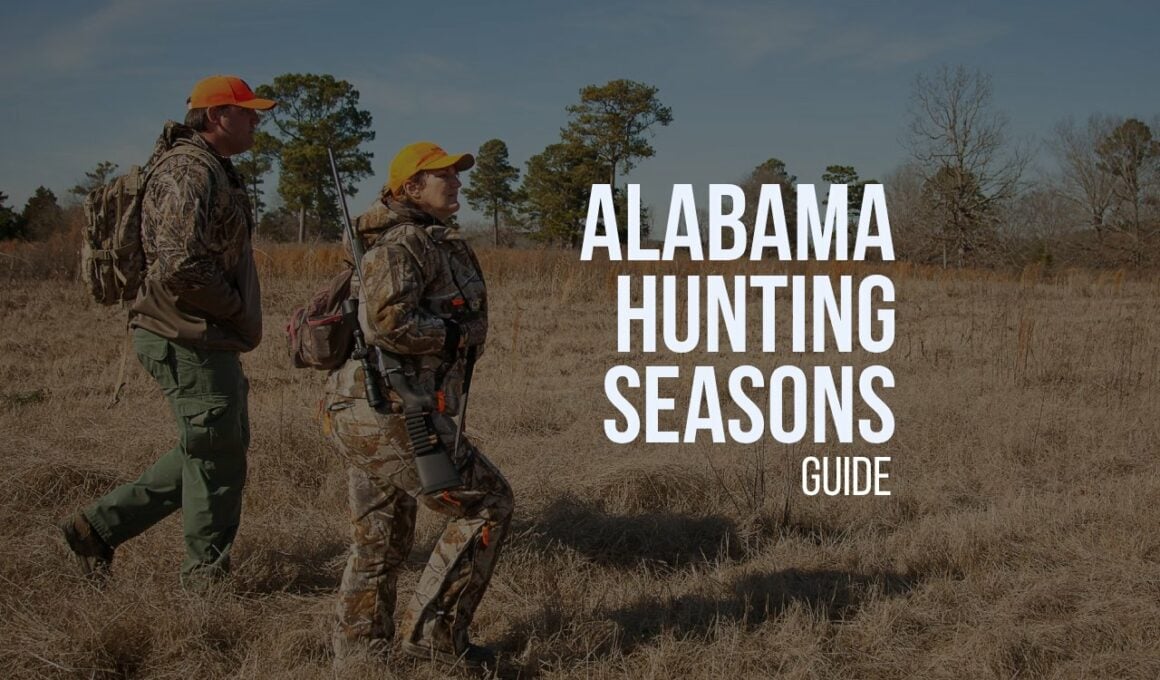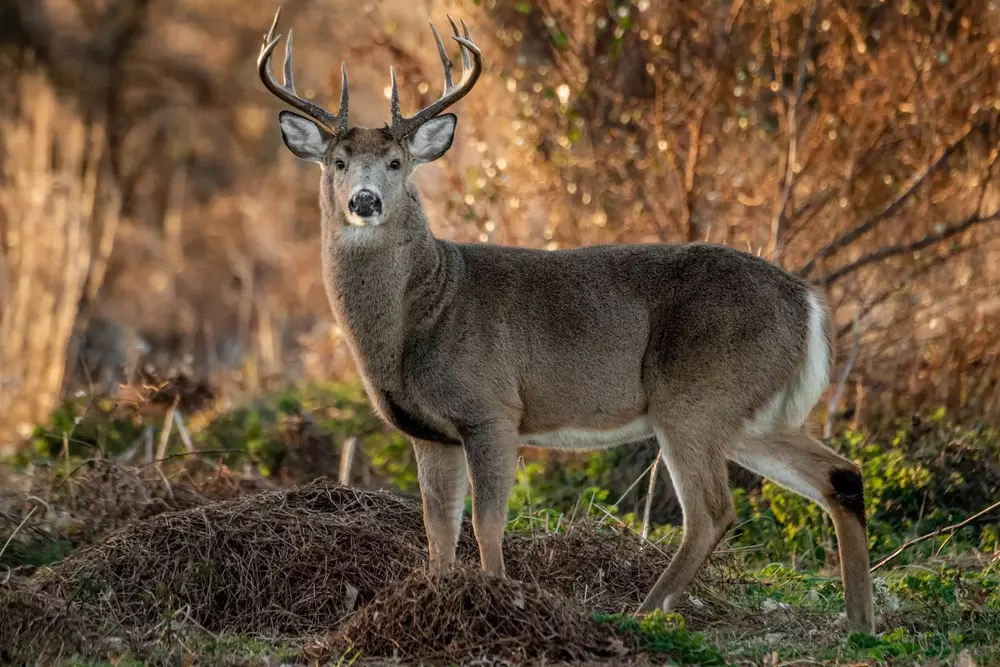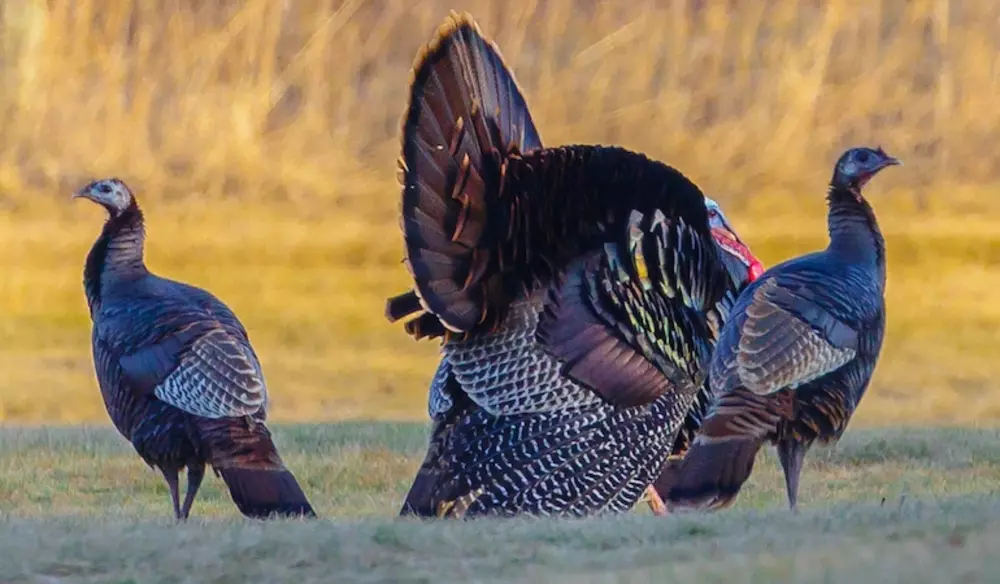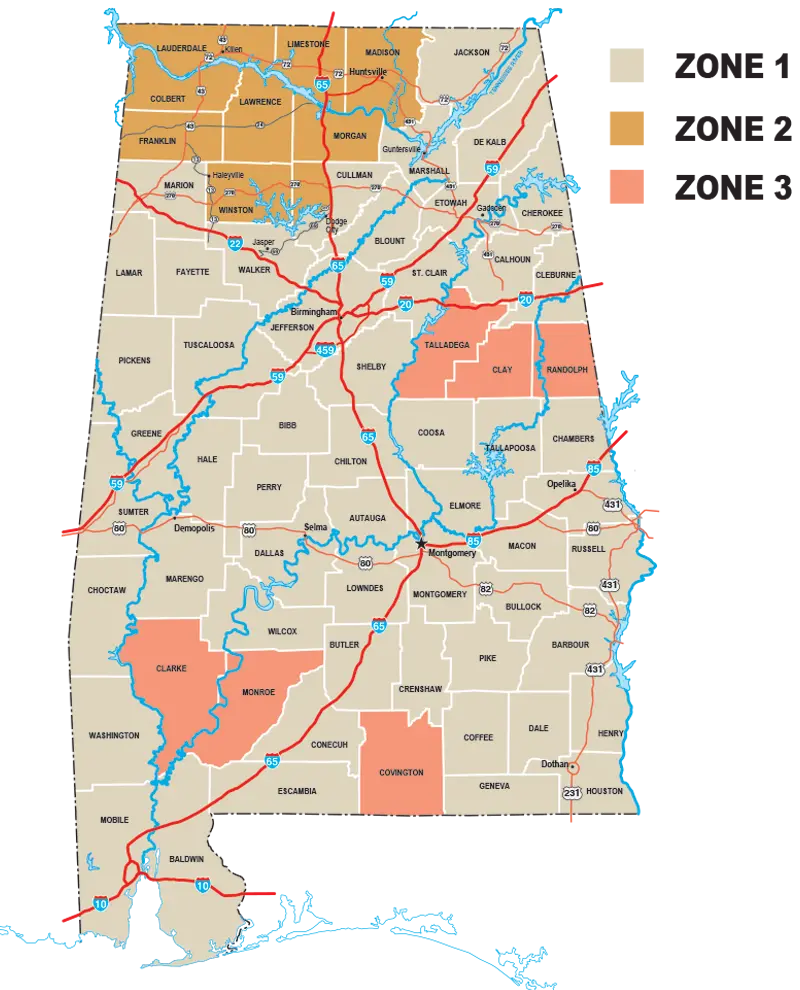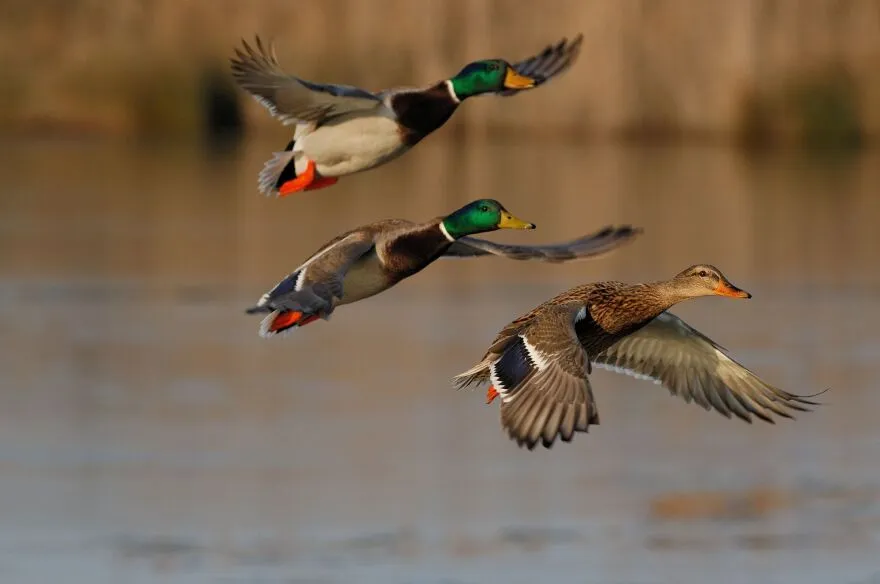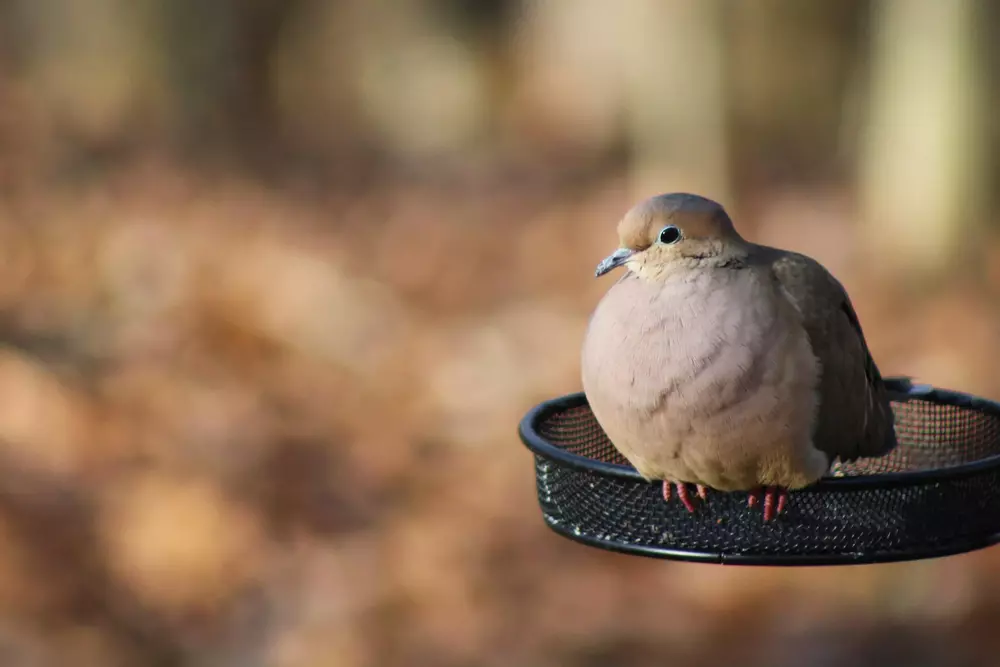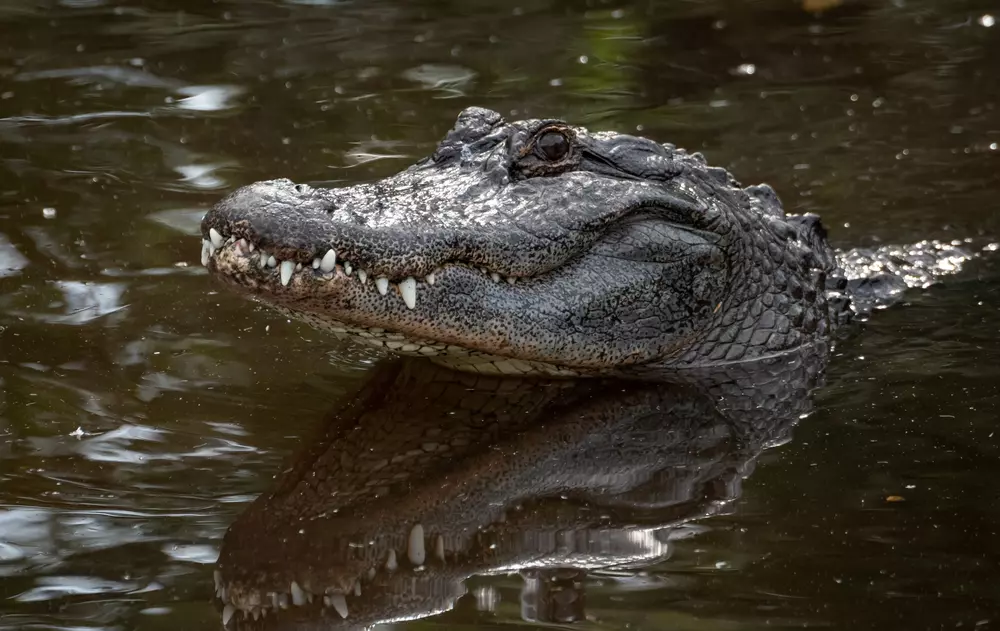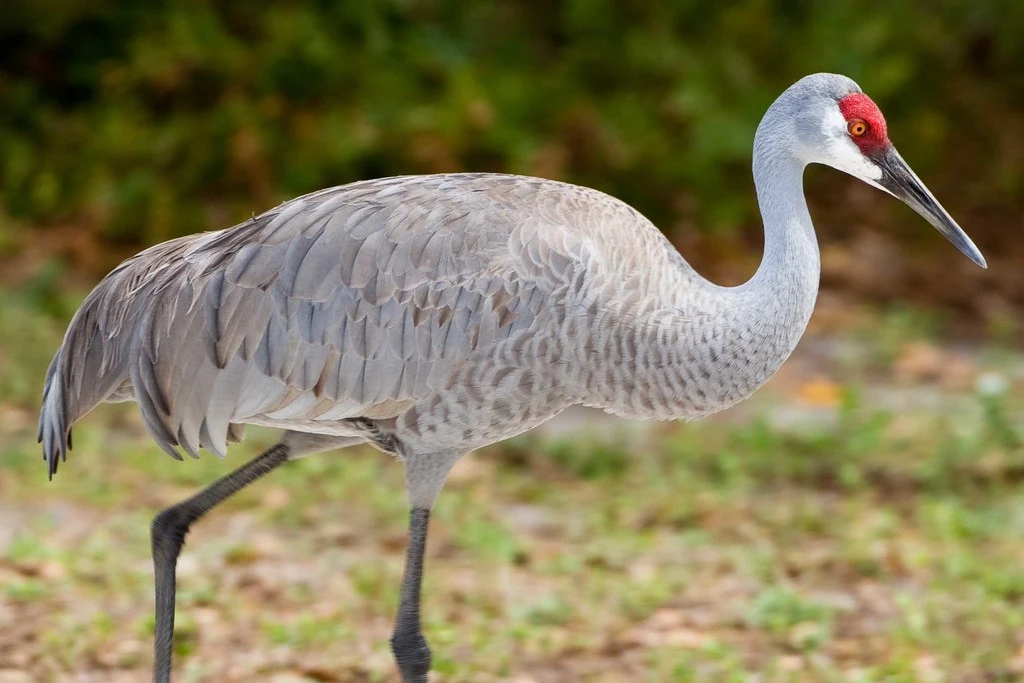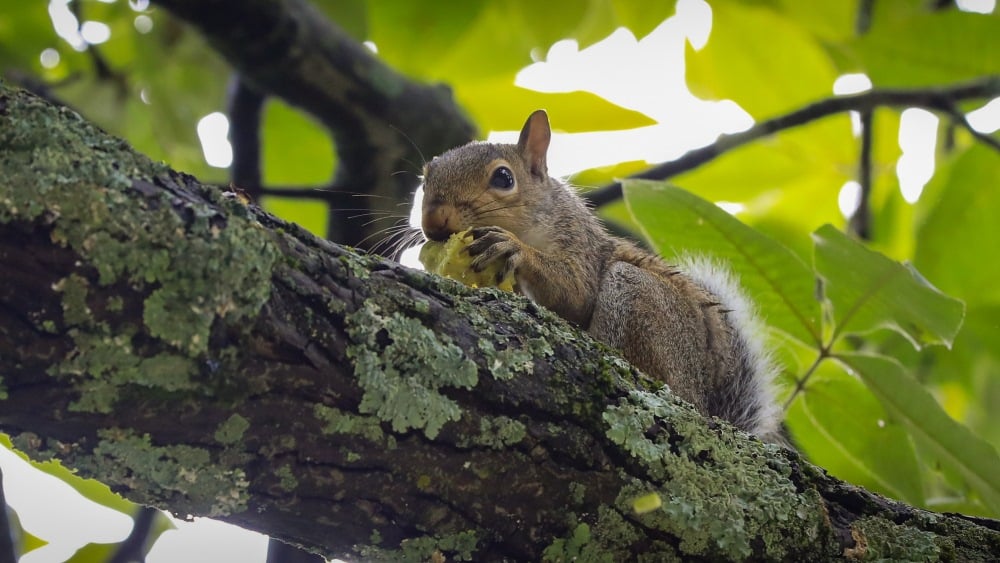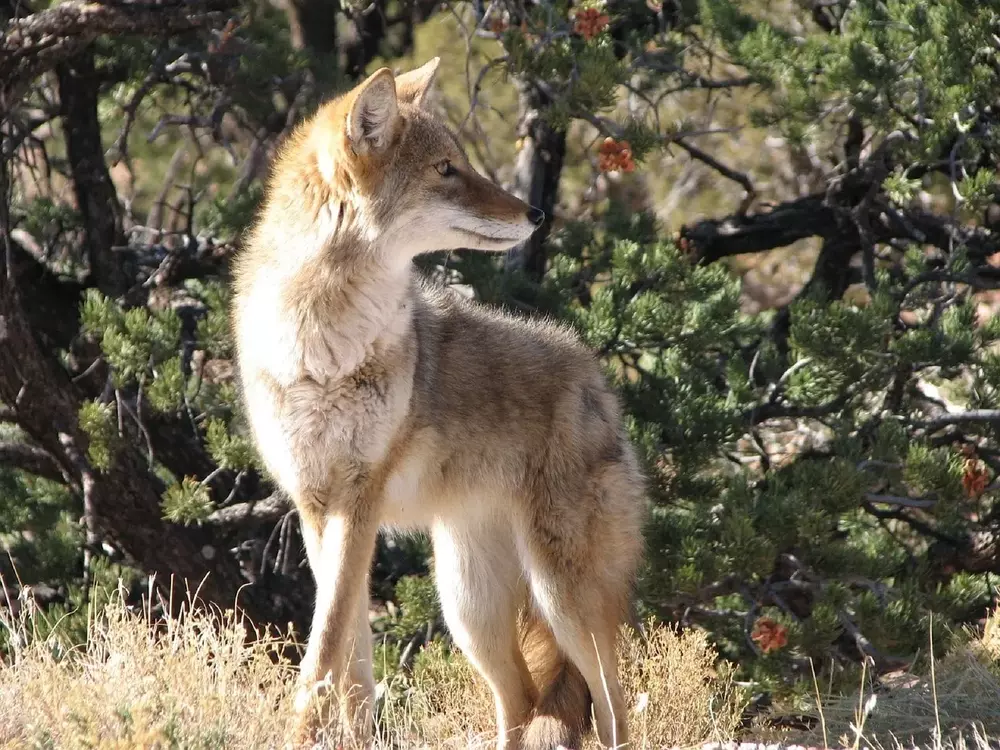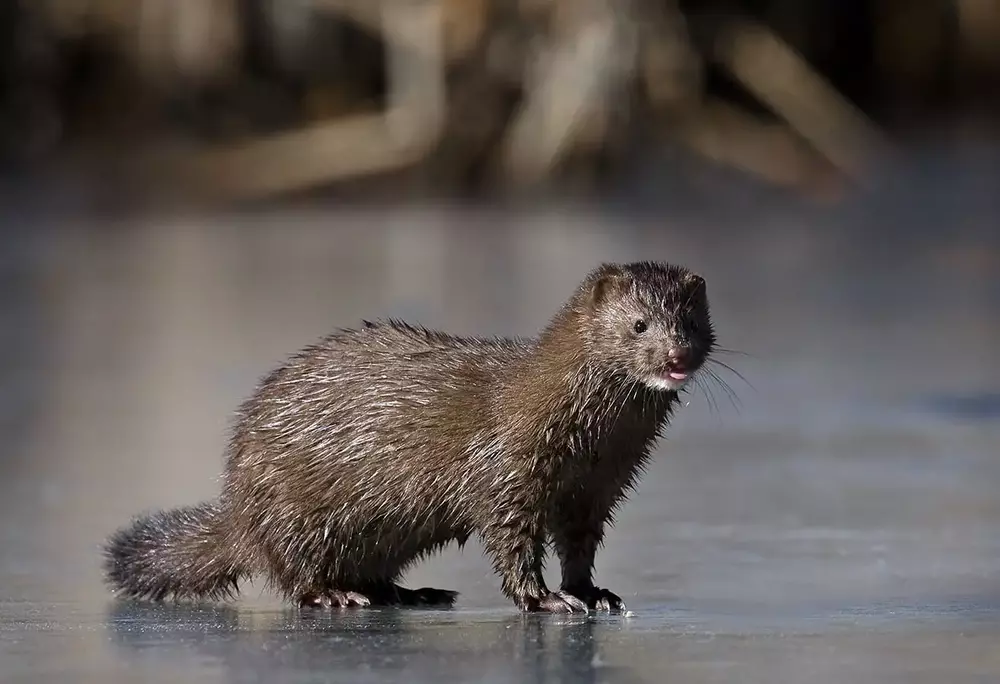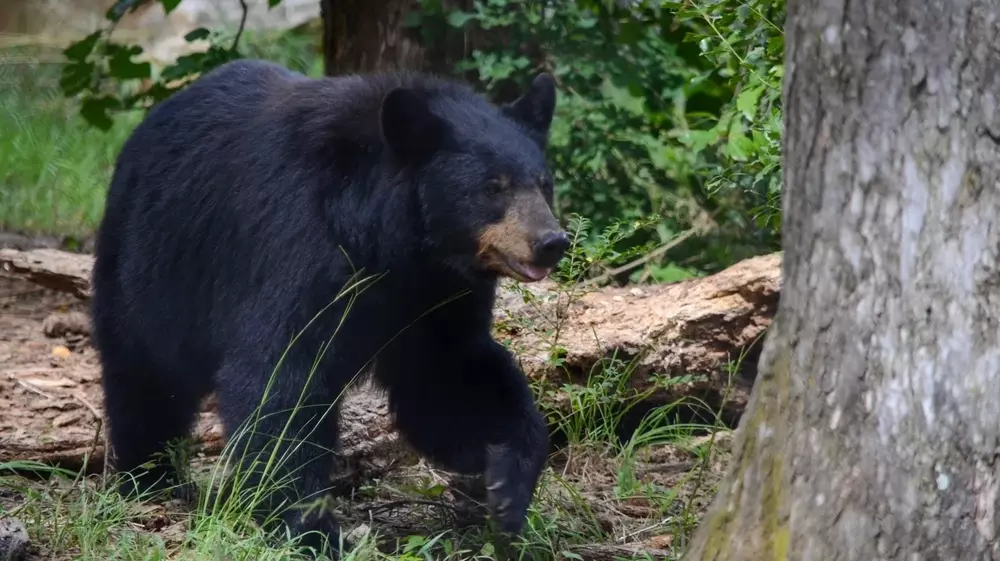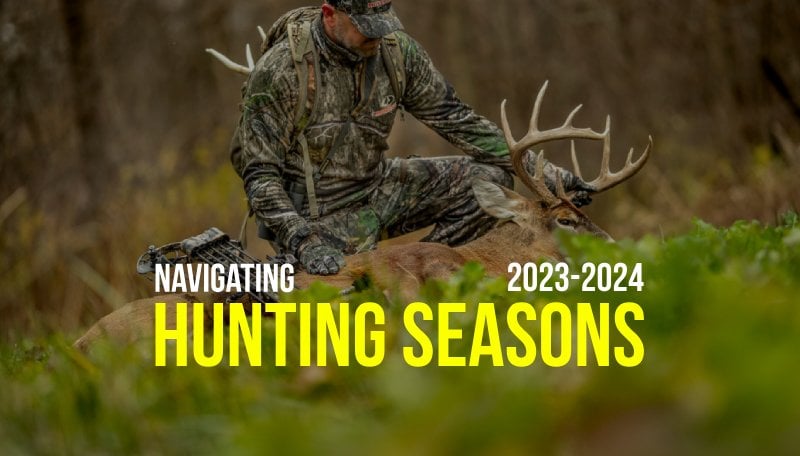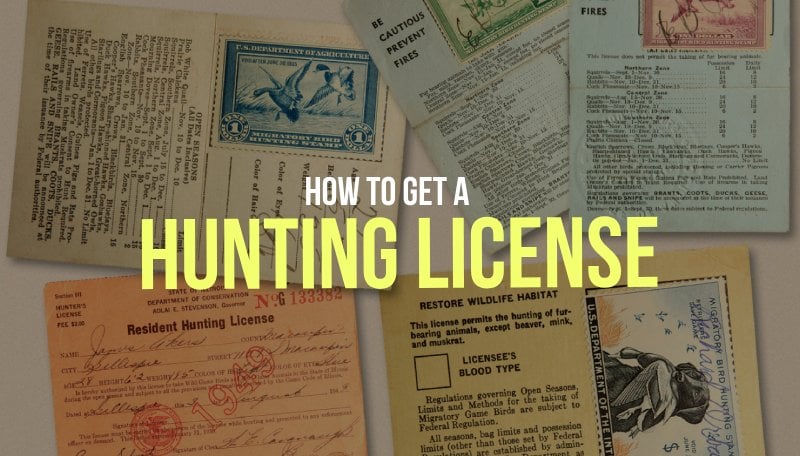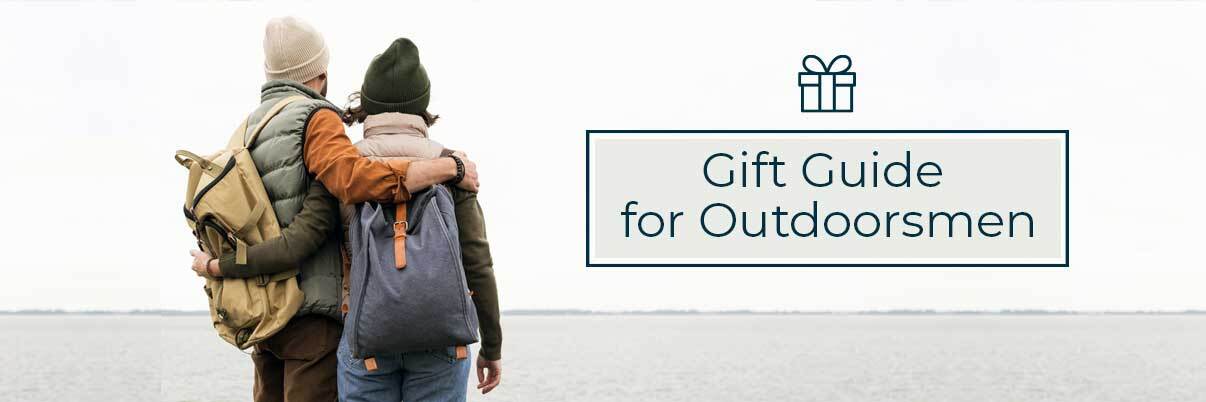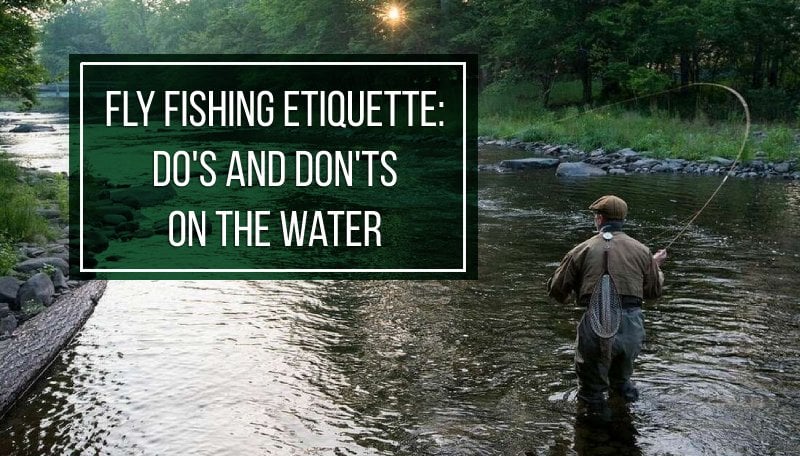Every state boasts a unique combination of hunting opportunities. Even though some species can be met in every state, there are those scattered in a seemingly random pattern across the country. Alabama abounds in game species, so hunting is a year-round activity. But even though the hunt seems to never stop, each species has a dedicated season. Outdoor Alabama has a comprehensive list of all Seasons and Bag Limits for the game species, so we’ve just made a compendium for the most popular game species.
Seasons by Game Species
| Deer | Turkey | Waterfowl |
| Fur-bearing Animals | Alligator | Sandhill Crane |
| Coyote, Bobcat, Feral Swine, and Fox | Mourning and White-Winged Dove | Bear, Mountain Lion and Ruffed Grouse |
Deer Hunting Season
Deer is hands down the nation’s most beloved game species. You can hunt bucks in every single state and there is a plethora of ways for you to do so. Regular firearms, muzzleloaders, bows and arrows – deer hunting can take on many forms. Alabama has an ample deer population and now is just the time for deer hunters to unholster their weaponry and get down to stalking.
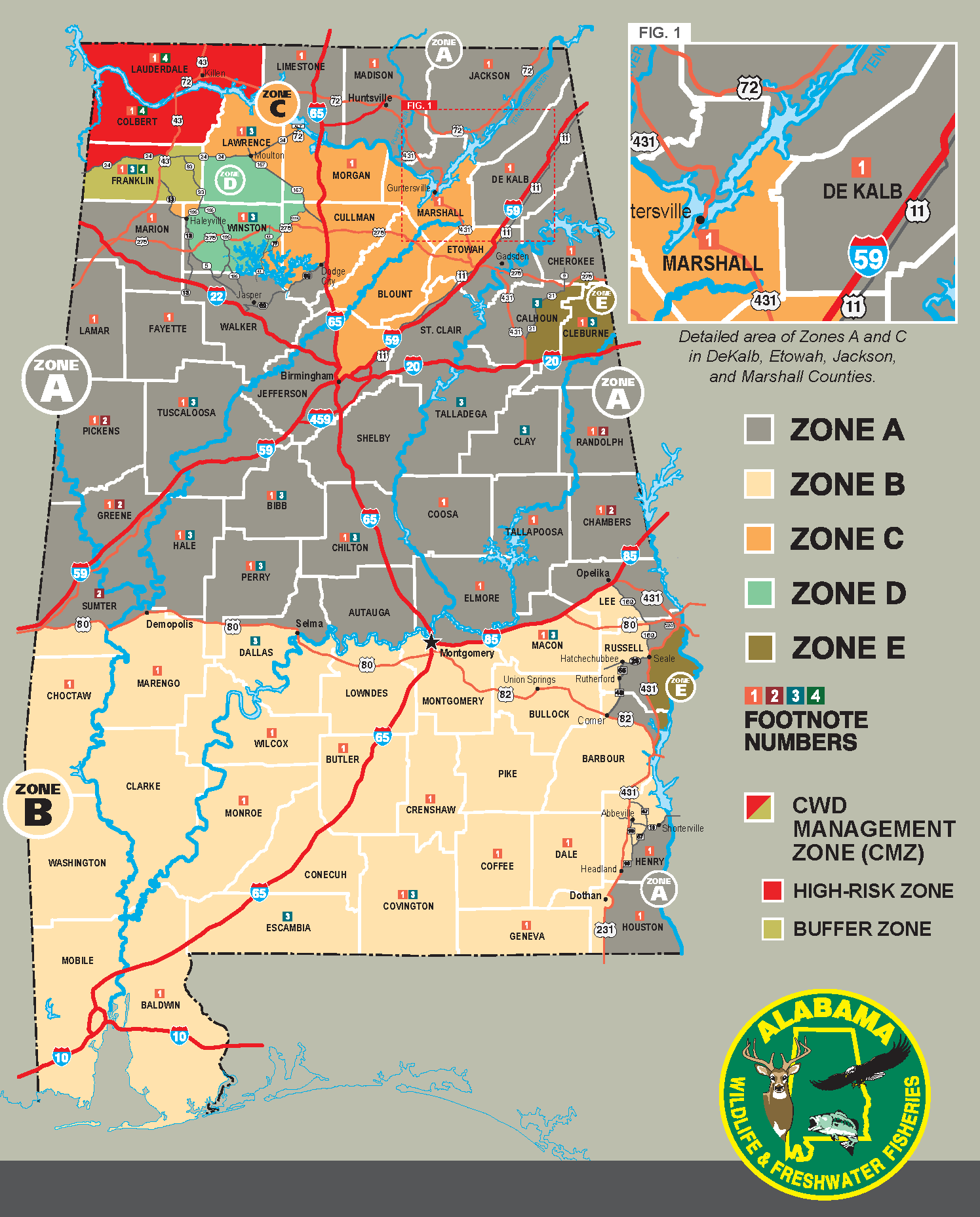
As you can see from the map, Alabama is split into five hunting zones – A, B, C, D, and E. There is also the Chronic Wasting Disease Management zone that was established after the first positive Chronic Wasting Disease test. You can still hunt in the area, it’s just that there are some extra precautions and rules you should follow. In all other respects, the rules are as usual. In each zone, there are different hunting periods for different types of hunting.
- Antlered Bucks: Male deer with one or more antlers visible above the natural hairline.
- Unantlered Deer: Deer without visible antlers above the natural hairline.
ARCHERY – STALK HUNTING:
- Zone A: Oct. 15, 2025 – Feb. 10, 2026 (Either Sex)
- Zone B:
- Oct. 15-24, 2025 (Antlered Bucks Only)
- Oct. 25, 2025 – Feb. 10, 2026 (Either Sex)
- Zone C: Oct. 15, 2025 – Feb. 10, 2026 (Either Sex)
- Zone D:
- Oct. 1, 2025 – Jan. 15, 2026 (Either Sex)
- Jan. 16-27, 2026 (Antlered Bucks Only)
- Zone E:
- Oct. 1, 2025 – Jan. 15, 2026 (Either Sex)
- Jan. 16-27, 2026 (Antlered Bucks Only)
- CMZ: Oct. 15, 2025 – Feb. 10, 2026 (Either Sex)
SPECIAL YOUTH GUN:
- Zone A, B, C, CMZ: Nov. 14-17, 2025 (Either Sex)
- Zone D, E: Oct. 31 – Nov. 3, 2025 (Either Sex)
SPECIAL MUZZLELOADER & AIR RIFLE:
- All Zones: Nov. 17-21, 2025 (Either Sex)
- Zone D, E: Nov. 3-7, 2025 (Either Sex)
GUN DEER – STALK HUNTING:
Private Land:
- Zone A, B, CMZ: Nov. 22, 2025 – Feb. 10, 2026 (Either Sex)
- Zone C:
- Nov. 22-30, 2025 (Either Sex)
- Dec. 1-12, 2025 (Antlered Bucks Only)
- Dec. 13, 2025 – Jan. 1, 2026 (Either Sex)
- Jan. 2 – Feb. 10, 2026 (Antlered Bucks Only)
- Zone D:
- Nov. 8-21, 2025 (Antlered Bucks Only)
- Nov. 22-30, 2025 (Either Sex)
- Dec. 1-12, 2025 (Antlered Bucks Only)
- Dec. 13, 2025 – Jan. 1, 2026 (Either Sex)
- Jan. 2-27, 2026 (Antlered Bucks Only)
- Zone E:
- Nov. 8, 2025 – Jan. 15, 2026 (Either Sex)
- Jan. 16-27, 2026 (Antlered Bucks Only)
Public Land:
- Zone A, B, CMZ:
- Nov. 22 – Dec. 12, 2025 (Antlered Bucks Only)
- Dec. 13, 2025 – Jan. 4, 2026 (Either Sex)
- Jan. 5 – Feb. 10, 2026 (Antlered Bucks Only)
- Zone C:
- Nov. 22 – Dec. 12, 2025 (Antlered Bucks Only)
- Dec. 13, 2025 – Jan. 1, 2026 (Either Sex)
- Jan. 2 – Feb. 10, 2026 (Antlered Bucks Only)
- Zone D:
- Nov. 8 – Dec. 12, 2025 (Antlered Bucks Only)
- Dec. 13, 2025 – Jan. 1, 2026 (Either Sex)
- Jan. 2-27, 2026 (Antlered Bucks Only)
- Zone E:
- Nov. 8 – Dec. 12, 2025 (Antlered Bucks Only)
- Dec. 13, 2025 – Jan. 1, 2026 (Either Sex)
GUN DEER – DOG HUNTING:
Private Land:
- Zone A, B, CMZ: Nov. 22, 2025 – Jan. 15, 2026 (Either Sex)
- Zone C:
- Nov. 22-30, 2025 (Either Sex)
- Dec. 1-12, 2025 (Antlered Bucks Only)
- Dec. 13, 2025 – Jan. 1, 2026 (Either Sex)
- Jan. 2-15, 2026 (Antlered Bucks Only)
- Zone D:
- Nov. 8-21, 2025 (Antlered Bucks Only)
- Nov. 22-30, 2025 (Either Sex)
- Dec. 1-12, 2025 (Antlered Bucks Only)
- Dec. 13, 2025 – Jan. 1, 2026 (Either Sex)
- Zone E: Nov. 8, 2025 – Jan. 1, 2026 (Either Sex)
Public Land:
- Zone A, B, CMZ:
- Nov. 22 – Dec. 12, 2025 (Antlered Bucks Only)
- Dec. 13, 2025 – Jan. 4, 2026 (Either Sex)
- Jan. 5-15, 2026 (Antlered Bucks Only)
- Zone C:
- Nov. 22 – Dec. 10, 2025 (Antlered Bucks Only)
- Dec. 13, 2025 – Jan. 1, 2026 (Either Sex)
- Jan. 2-15, 2026 (Antlered Bucks Only)
- Zone D:
- Nov. 8 – Dec. 12, 2025 (Antlered Bucks Only)
- Dec. 13, 2025 – Jan. 1, 2026 (Either Sex)
- Zone E:
- Nov. 8 – Dec. 12, 2025 (Antlered Bucks Only)
- Dec. 13, 2025 – Jan. 1, 2026 (Either Sex)
Bag Limits
White-Tailed Antlered Buck Limit:
- Statewide: 3 per hunter (1 per day). One must have at least 4 points (1 inch or longer) on one antler, except in Barbour County.
- Barbour County Exception: Bucks must have 3 points on one side (except during youth hunts).
- WMA Bonus Buck: 1 additional buck allowed on specific WMA hunt dates, not counting toward the 3-buck limit. Must be validated at the WMA check station.
White-Tailed Unantlered Deer Limit:
- Zones A, B, D, E, CMZ: 2 unantlered deer or 1 unantlered deer + 1 antlered buck per day.
- Zone C: 1 unantlered deer + 1 antlered buck per day.
Special Exceptions:
Dog Deer Hunting:
- Prohibited (except by special permit): Baldwin, Chambers, Choctaw (specific areas), Colbert (west of US Hwy. 43), Coosa, Covington (north of US Hwy. 84), Elmore (specific boundaries), Geneva, Henry, Macon (specific boundaries), Marengo, Monroe, Pickens (north of US Hwy. 82), Tallapoosa, Wilcox.
- Allowed on private property without permit: Chambers and Coosa counties.
- Prohibited on Open Permit-Public Land.
Stalk Hunting Only (No Dogs):
- Prohibited with dogs: Bibb, Perry (specific boundaries), Butler (south of AL Hwy. 106, east of I-65), Cherokee, Chilton, Cleburne, Coffee (specific boundaries), Crenshaw (specific boundaries), Dale (specific boundaries), DeKalb, Elmore (specific boundaries), Fayette (specific boundaries), Franklin, Hale, Greene, Houston, Jackson, Lamar, Lauderdale, Lawrence, Limestone, Madison, Marion, Marshall, Morgan, Randolph, Tuscaloosa (north of US Hwy. 82), Winston (specific boundaries).
U.S. Army Corps of Engineers (USACE) Lands:
- Seasons align with private/leased lands unless further restricted by USACE.
- Special permits may be required; some areas are closed to hunting.
- Check USACE regulations before hunting.
U.S. Forest Service (USFS):
- Stalk Hunting (No Dogs): Same dates as open permit for the county; one deer per day.
- Dog Deer Hunting: Allowed only in Calhoun, Clay, and Talladega counties on Thursdays, Fridays (until 2 PM), and weekends during legal hours. No hunting Monday-Wednesday unless Christmas or New Year’s Day falls on those days.
- Piney Woods/Ivory Mountain Area: No dog deer hunting allowed (specific boundaries apply).
- Abandonment of personal property (e.g., tree stands, equipment) is prohibited.
Chronic Wasting Disease Management Zone (CMZ):
- On private/leased land: Two unantlered deer per day during Deer Gun Season.
- Does not apply to WMAs, Community Hunting Areas, or open permit public lands.
Special Youth Deer Hunting (Under 16):
- Statewide on private, leased, and open permit-public lands (excluding WMAs).
- Same legal arms and ammunition as regular Deer Season.
See details here.
License Requirements
When it comes to license requirements, anyone hunting white-tailed deer in Alabama needs an All Game Hunting License (unless exempt), a Harvest Record (either paper form or on an app), and a Wildlife Management License and map permit if you’re hunting in a Wildlife Management Area.
CMZ Hunting Recommendations
If you happen to live in a CMZ and don’t want to go anywhere else to hunt, there are some tips you will benefit from.
- If you spot a deer that’s acting odd or looking under the weather, it’s best to leave it be. Don’t try to handle it.
- When you get down to field dressing, make sure you’re using latex or rubber gloves.
- Keep your kitchen utensils in the kitchen. Use a dedicated knife.
- It’s crucial to debone your meat if you want to process or consume it later.
- When handling the organs, keep it to a minimum. Don’t saw through bone or cut through the brain, backbone or spinal cord.
- If you’re getting your deer commercially processed, ask them to process your deer separately, without mixing in meat from other deer.
Turkey Hunting Season
Just like with deer, Alabama is divided into zones for turkey hunting, only this time it’s three. Each zone has its own schedule and rules, so it’s important to keep in mind where exactly you plan to hunt.
Fall Turkey Season:
- Zone 3: Nov. 15-23 (NO Decoys Allowed); Dec. 13-28 (NO Decoys Allowed)
Spring Turkey Season:
- WMA & Bankhead Ranger Districts: April 8 – May 8 (Daylight to 1 PM; Decoys Allowed April 11 – May 8)
- National Forest Districts & WMAs: April 1 – May 8 (Daylight to 1 PM; Decoys Allowed April 4 – May 8)
- Zone 1 & Zone 3: March 25 – May 8 (Decoys Allowed April 4 – May 8)
- Zone 2: April 1 – May 8 (Decoys Allowed April 11 – May 8)
Special Youth Hunt:
- WMA & Bankhead Ranger Districts: April 4 (Daylight to 1 PM; Decoys Allowed)
- National Forest Districts & WMAs: March 28 (Daylight to 1 PM; Decoys Allowed)
- Zone 1 & Zone 3: March 21-22 (Decoys Allowed)
- Zone 2: March 28-29 (Decoys Allowed)
Special Disabled Hunt:
- WMA & Bankhead Ranger Districts: April 7 (Daylight to 1 PM; Decoys Allowed)
- National Forest Districts & WMAs: March 31 (Daylight to 1 PM; Decoys Allowed)
- Zone 1 & Zone 3: March 24 (Decoys Allowed)
- Zone 2: March 31 (Decoys Allowed)
Bag Limits
- 1 gobbler per day; 4 gobbler limit for combined fall and spring seasons.
- No more than 2 gobblers from any one WMA, CHA, or National Forest Ranger District.
- No more than 1 gobbler during the first 10 days of each season from each WMA, CHA, or National Forest Ranger District.
- GOBBLERS ONLY!
License Requirements
When it comes to licenses, you’ll need a Small Game or All Game Hunting License. If you’re hunting on a licensed preserve, a 7-day Commercial Fowl Hunting Preserve License will do. Hunting on a WMA? Residents can use a Wildlife Heritage License instead of a Small Game or All Game License, but they’ll also need a WMA map permit. Non-residents need a state license, a WMA license, and a WMA map permit.
Waterfowl Hunting Season
There is no strict zone designation for waterfowl hunting, mainly because such birds all gather in particular places. Season dates are tied to migration patterns, and they are different for different species.
Duck, Coot, and Merganser:
- Dates: Nov. 28 – Nov. 29 and Dec. 5 – Jan. 31
- Shooting Hours: Half-hour before sunrise to sunset
- Duck Bag Limit: 6 per day, including:
- 4 Mallards (max 2 females)
- 3 Wood Ducks
- 1 Mottled Duck
- 2 Black Ducks
- 2 Redheads
- 3 Pintails
- 2 Canvasbacks
- 1 Scaup
- Coot Bag Limit: 15 per day
- Merganser Bag Limit: 5 per day (max 2 Hooded Mergansers)
Geese:
- Shooting Hours: Half-hour before sunrise to sunset
- Dates:
- Sept. 6 – Oct. 5
- Oct. 18 – Nov. 1
- Nov. 28 – Nov. 29
- Dec. 5 – Jan. 31
- Bag Limits:
- Dark Geese (Canada, White-Fronted, Brant): 5 per day (aggregate)
- Light Geese (Snow, Blue, Ross’s): 5 per day (aggregate)
Special Teal Season:
- Dates: Sept. 13 – Sept. 21
- Bag Limit: 6 per day
- Shooting Hours: Half-hour before sunrise to sunset
Clapper Rail, King Rail, Virginia Rail, Sora, and Gallinule:
- Dates: Sept. 13 – Sept. 21 and Nov. 28 – Jan. 27
- Bag Limit: 15 per day
- Shooting Hours: Half-hour before sunrise to sunset
Special Youth, Active Military, and Veteran Waterfowl Hunting Days:
- Dates: Nov. 22 and Feb. 7
- Details: Same shooting hours, bag limits, and legal arms/ammunition as regular waterfowl season.
Note: Federal guidelines were not final at the time of printing. Refer to the Alabama Waterfowl Hunting Guide for updates.
License Requirements
Hunting waterfowl in Alabama calls for more than getting a Hunting License. You would also need a Federal Duck Stamp and an Alabama Duck Stamp (unless exempt). It’s also mandatory to have Harvest Information Program Certification (you don’t need to pay to get one). If you plan to hunt in a wildlife management area, you need to possess a Wildlife Management License.
Mourning and White-Winged Dove
Both doves are some of the most sought-after bird species in Alabama. The hunting season lasts for more than 4 months, so hunters are granted plenty of opportunities to get their hands on some quality trophies.
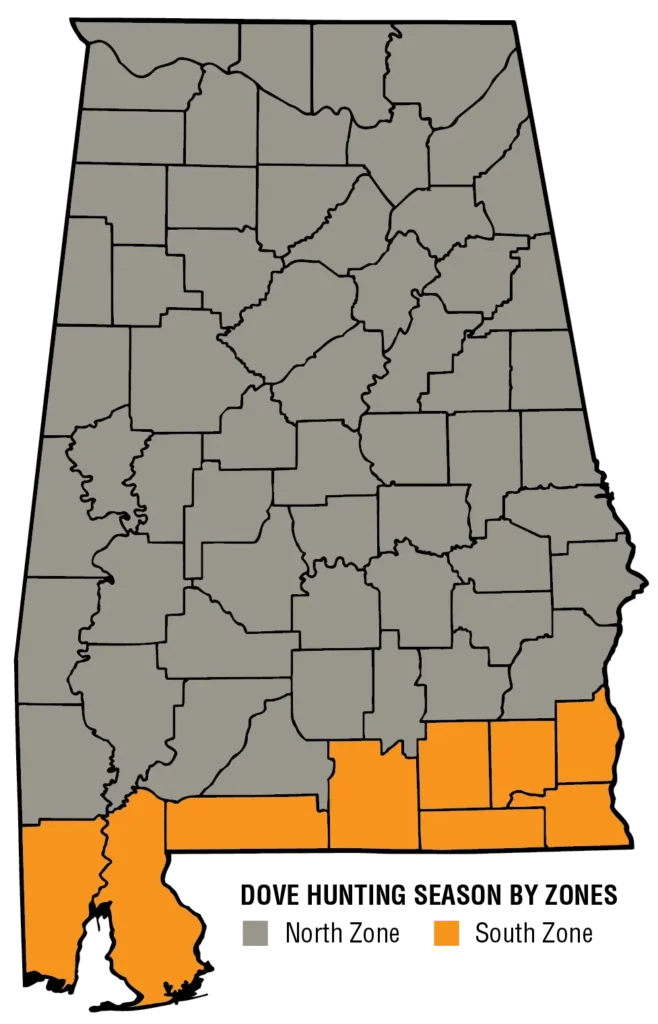
Dove Hunting Season Dates in Alabama:
North Zone:
- Sept. 6: Noon to Sunset (Afternoon Only)
- Sept. 7 – Oct. 19: Half-hour before Sunrise to Sunset (All Day)
- Nov. 22 – Nov. 30: Half-hour before Sunrise to Sunset (All Day)
- Dec. 13 – Jan. 18: Half-hour before Sunrise to Sunset (All Day)
- Bag Limit: 15 doves per day (90-day season)
South Zone:
- Sept. 13: Noon to Sunset (Afternoon Only)
- Sept. 14 – Oct. 26: Half-hour before Sunrise to Sunset (All Day)
- Nov. 22 – Nov. 30: Half-hour before Sunrise to Sunset (All Day)
- Dec. 13 – Jan. 18: Half-hour before Sunrise to Sunset (All Day)
- Bag Limit: 15 doves per day (90-day season)
Legal Dove Hunting Practices:
- Hunting over lands where seeds or grains are scattered due to normal agricultural operations (e.g., harvesting, planting, post-harvest manipulations).
- Hunting over wildlife food plots planted according to Cooperative Extension Service guidelines.
- Hunting over standing crops, manipulated natural vegetation, or pasture improvements.
- Hunting from blinds camouflaged with natural vegetation.
Harvest Information Program (HIP):
- Requirement: Hunters of migratory birds (e.g., doves, ducks, geese, etc.) must participate in HIP to help estimate bird harvests and inform management decisions.
- Learn more about HIP through Alabama wildlife agency.
For additional details, consult the ADCNR Dove Zone Map (above) or the Alabama Cooperative Extension System for planting recommendations.
License Requirements
Now, onto licenses. To hunt doves in Alabama, you’ll need a Small Game or All Game Hunting License. You’re required to participate in the Harvest Information Program (HIP). It’s basically the same for the majority of game bird species, including ducks, coots, geese, brant, swans, woodcock, rails, snipe, sandhill cranes, band-tailed pigeons, or gallinules. It’s a bit of extra paperwork, but it’s essential for managing and conserving migratory bird populations.
Alligator Hunting Season
Ever thought about hunting alligators? It’s quite the rush, and Alabama is a great place to do it. However, in addition to meeting regular requirements, you’ll need Fortune’s favor. And I’m not talking about coming across an alligator but rather getting a chance to legally harvest one.
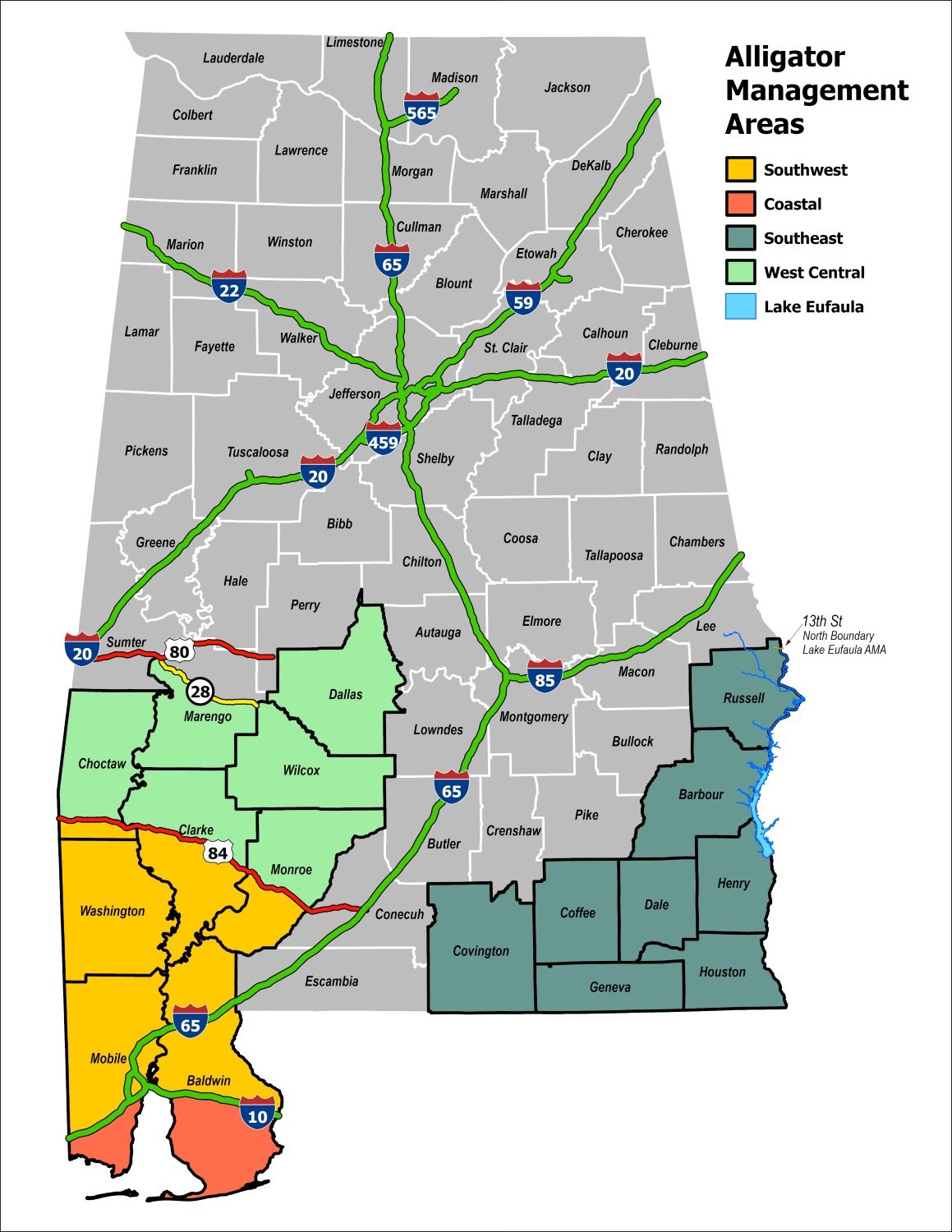
Alligator Hunting Season Dates in Alabama
By Special Permit Only.
- Southwest, Coastal, West Central, and Lake Eufaula Management Areas:
- Second Thursday in August: Sunset to the following Sunday at Sunrise.
- Third Thursday in August: Sunset to the following Sunday at Sunrise.
- Second Thursday in September: Sunset to the following Sunday at Sunrise.
- Southeast Management Area:
- Second Saturday in August: Sunset to the first Monday in September at Sunrise.
- Hunting Hours: Sunset to Sunrise.
Bag Limits
- Bag Limit: 1 alligator per permit.
- Size Limit:
- Lake Eufaula Management Area: Minimum 8 feet.
- Other AMAs: No size limit for standard permits; bonus permits limited to alligators no larger than 6 feet.
Permits and License Requirements
Permit Holders must carry a government-issued photo ID, valid Alabama all game or small game hunting license, and Alligator Harvest Permit.
Hunting Assistants (16+ years old) must have a valid Alabama all game or small game hunting license. Anyone in the boat or assisting boats is considered a Hunting Assistant.
Resident Permits:
- Alligator Harvest Permit: $250 (1 alligator).
- Bonus Management Harvest Permit: $125 (1 additional alligator, max 6 feet).
Non-Resident Permits:
- Alligator Harvest Permit: $1,000 (1 alligator).
- Bonus Management Harvest Permit: $500 (1 additional alligator, max 6 feet).
Possession Tags:
- Temporary tags must be attached immediately after dispatch.
- Permanent CITES tags issued at check stations after reporting harvest details.
Application Process
- Registration: Opens June 3, 2025, at 8:00 AM via Outdoor Alabama.
- Deadline: Closes July 8, 2025, at 8:00 AM.
- Drawing Date: July 9, 2025.
- Acceptance Deadline: Selected applicants must accept by July 16, 2025, at 8:00 AM.
- Preference Points: Repeat applicants gain higher selection chances unless they skip a year or accept a permit.
Eligibility
- Residents and Non-Residents: Must be 16+ years old with a valid Alabama hunting license.
- Hunting Assistants: Must also hold a valid hunting license.
Mandatory Training
- All selected applicants must complete an online Alligator Training Course before accepting their permit.
Capture and Dispatch Methods
Capture Requirements:
- Alligators must be captured and restrained (noose or snare secured around neck/leg) before dispatching.
- Allowed Capture Equipment: Hand-held snares, snatch hooks (hand-held or rod/reel), harpoons (with attached line), and bowfishing equipment (line attached from arrow to bow/crossbow).
- Prohibited: Use of bait, culling, or capturing alligators for non-harvest purposes (e.g., photos).
Dispatch Requirements:
- Alligators must be dispatched immediately once restrained.
- Allowed Firearms:
- Shotguns (shot size no larger than #4).
- Bangsticks (.38 caliber or larger).
- Firearms and bangsticks must remain cased and unloaded until the alligator is restrained.
- Prohibited: Discharging firearms or bangsticks within 100 yards of residences, buildings, boat ramps, or campsites in Mobile/Baldwin Counties, Alabama River, Claiborne Lake, William “Bill” Dannelly Reservoir, and Lake Eufaula.
Tagging:
- Attach the Temporary Alligator Possession Tag to the tail immediately after dispatch and before moving or transporting.
Mandatory Check Stations & Harvest Reporting
Southwest, Coastal, West Central, and Lake Eufaula Management Areas:
- Harvested alligators must be brought to a designated check station during scheduled hunt dates (8:00 PM – 7:00 AM).
- Wildlife and Freshwater Fisheries (WFF) personnel will issue a permanent Federal CITES Alligator Possession Tag.
Southeast Management Area:
- Harvested alligator hides, Temporary Alligator Possession Tag, and harvest data (length, weight, girth, sex) must be submitted to a WFF district office within 10 business days.
- Permanent CITES tags will be issued after validation.
General Regulations
- Handguns for personal protection are allowed but cannot be used for hunting or dispatching alligators.
- All boating and hunting laws must be followed.
- Violations are subject to penalties as provided by law.
Sandhill Crane Season
Let’s talk about something equally exciting as alligator hunting – the Sandhill Crane Season of 2025-26. It’s a special event with an element of exclusivity to it. If you want to give it a try, make sure to prepare beforehand.
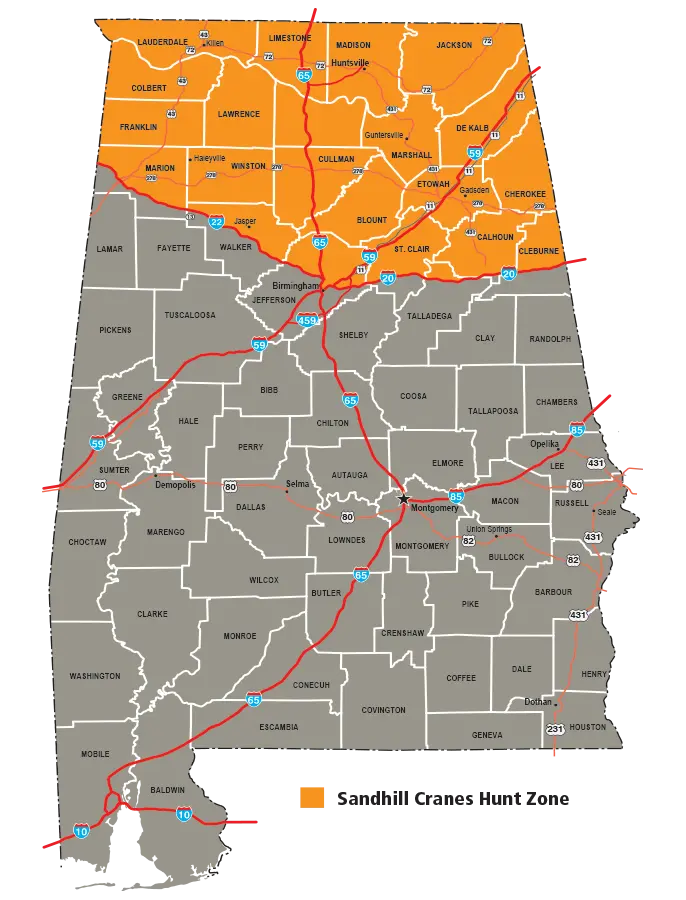
Sandhill Crane Hunting Season Dates in Alabama
November 28 – January 4 and January 12 – January 26
Bag Limit: 3 Sandhill Cranes per person per permit.
Shooting Hours: Sunrise to Sunset.
Legal Arms & Ammunition: Same as waterfowl regulations.
Hunt Zone:
- North of Interstate 20 (from the Georgia state line to the I-65 interchange).
- East of Interstate 65 (to the I-22 interchange).
- North of Interstate 22 (to the Mississippi state line).
- Excludes: The remainder of the state.
Permit Information
By Limited Quota Permit Only – Apply online at Outdoor Alabama.
- Eligibility: Alabama residents and Lifetime Hunting License holders, 16+ years old, with a valid hunting license (license not required for individuals 65+).
- Fees:
- No fee to apply.
- $20 fee (plus processing fee) to accept the permit.
Harvest Information Program (HIP) Requirement
Hunters of migratory birds (e.g., doves, ducks, geese, sandhill cranes, etc.) must participate in HIP. HIP provides data for managing hunting seasons, bag limits, and bird populations.
License Requirements
To apply for a permit, you need to be at least sixteen (16) years old and either a resident or a lifetime hunting license holder in Alabama. The permits are limited in number and the chances are they are already given away, given how close the season is.
Third time’s a charm, don’t forget about the Harvest Information Program (HIP). If you’re hunting sandhill cranes, you’re required to participate. It helps provide reliable estimates of the number of migratory birds harvested each season.
Squirrel and Small Game Seasons
Squirrel Season
- Dates: September 13 – March 1
- Bag Limit: 8 per day, 8 in possession
- Special Note: Fox squirrel hunting is closed on the Bankhead National Forest.
Rabbit Season
- Dates: September 13 – March 1
- Bag Limit: 8 per day, 8 in possession
Bobwhite Quail Season
- Dates: November 1 – February 28
- Bag Limit: 8 per day, 8 in possession
- Special Note: Hunting is closed on the Bankhead National Forest.
Woodcock Season
- Dates:
- December 13 – December 14
- December 20 – January 31
- Bag Limit: 3 per day
- Shooting Hours: Half-hour before sunrise to sunset
- Note: Contingent upon federal register.
- HIP Requirement: Participation in the Harvest Information Program (HIP) is mandatory.
Snipe Season
- Dates: November 8 – February 22
- Bag Limit: 8 per day
- Shooting Hours: Half-hour before sunrise to sunset
- HIP Requirement: Participation in the Harvest Information Program (HIP) is mandatory.
King Rail, Clapper Rail, Virginia Rail, Sora, and Gallinule Seasons
- Dates:
- September 13 – September 21
- November 28 – January 27
- Bag Limit: 15 per day
- Shooting Hours: Half-hour before sunrise to sunset
- HIP Requirement: Participation in the Harvest Information Program (HIP) is mandatory.
Coyote, Bobcat, Feral Swine and Fox Seasons
Daytime Hours Only: No Bag Limit, No Closed Season
Bobcat
- Tagging:
- All bobcats must be tagged by Wildlife and Freshwater Fisheries Division within 14 days of harvest. Alternatively, they may be left with a taxidermist with a completed tagging form, and the taxidermist must tag them within 14 days.
- Trapping Season: October 25 – February 28 (licensed fur catchers only).
- Dog Restrictions: No running of dogs on open-permit lands during daytime or after 3:00 AM during spring turkey season.
Coyote
- Daytime Hunting: No bag limit, no closed season.
- Special Nighttime Season (Privately Owned and Leased Lands Only):
- Dates: Begins the day after the last day of gun deer season and ends 30 minutes before sunrise on the opening day of archery deer season in that zone.
- License Required: Must have a valid annual resident or nonresident nighttime feral swine and coyote hunting license.
- Trapping: Allowed by landowner or their agent.
Feral Swine
- Daytime Hunting: No bag limit, no closed season.
- Special Nighttime Season (Privately Owned and Leased Lands Only):
- Dates: Begins the day after the last day of gun deer season and ends 30 minutes before sunrise on the opening day of archery deer season in that zone.
- License Required: Must have a valid annual resident or nonresident nighttime feral swine and coyote hunting license.
- Special Nighttime Season (Dogs Only):
- Dates: May 9 – August 31, 2026.
- Restrictions: Dogs only; no firearms allowed.
- Trapping: Allowed by landowner or their agent.
- Release Prohibition: It is unlawful to release live feral swine after capture.
Fox
- Trapping: Limited to legal furbearer season by licensed fur catchers only.
Additional Notes
- Tagging for Bobcat and Otter: Same tagging requirements as bobcats apply to otters.
- Dog Restrictions: Dogs cannot be used to hunt during or in areas of spring turkey season.
License Requirements
For the most part, you only need the regular hunting license, unless you are hunting on your grounds. However, if you plan to hunt coyote or swine at night, you need a valid annual resident or nonresident nighttime feral swine and coyote hunting license. All harvested bobcats must be tagged by a representative of the Wildlife and Freshwater Fisheries Division within 14 days of harvest.
Furbearers Season
Raccoon Season
- Season Dates: No Closed Season
- Hunting Hours: Daytime or nighttime
- Bag Limit:
- Private Owned and Leased Lands: No bag limit
- Open Permit Public Land: 5 per party
- Dog Restrictions: No running of dogs on open-permit lands during daytime or after 3:00 AM during spring turkey season.
Opossum Season
- Season Dates: No Closed Season
- Hunting Hours: Daytime or nighttime
- Bag Limit: No bag limit
- Dog Restrictions: No running of dogs on open-permit lands during daytime or after 3:00 AM during spring turkey season.
Mink, Muskrat, Otter, and Striped Skunk Season
- Season Dates: October 25 – February 28
- Bag Limit: No bag limit
- Method of Take: Trapping Only
Beaver, Nutria, and Groundhog Season
- Season Dates: No Closed Season
- Bag Limit: No bag limit
- Hunting Hours: Daylight hours only
Trapping Season
Bobcat, Fox, Mink, Muskrat, Otter, and Striped Skunk: October 25 – February 28
Beaver, Coyote, Nutria, Feral Swine, Raccoon, and Opossum: No Closed Season
Special Notes
Nuisance Furbearers: A permit may be obtained through your local district office for trapping nuisance furbearers outside the regular trapping season dates.
Bobcat and Otter Tagging Requirement:
- All bobcats and otters, regardless of harvest method, must be tagged by a Wildlife and Freshwater Fisheries (WFF) Division representative within 14 days of harvest.
- Alternatively, they may be left with a taxidermist with a completed tagging form, and the taxidermist must ensure tagging within 14 days of receipt.
Trapping Workshops
- WFF, in collaboration with the Alabama Trappers and Predator Control Association, The Safari Club, and USDA Wildlife Services, hosts adult and youth trapping workshops throughout the state.
- For dates and locations, visit Outdoor Alabama.
Conclusion
As you can see, some Alabama hunting seasons are in full swing, while others are yet to come. Make sure you are prepared for the season that is of most interest to you and put your licenses in order. With that out of the way, there will be nothing standing between you and your trophies.
FAQs
What are the specific dates for the deer hunting season in Alabama?
The specific dates for the deer hunting season in Alabama vary by zone and also the hunting method. With all these periods combined, it lasts from September to February, but not with a lot of breaks and restrictions.
How many antlered bucks can I take in Alabama?
You can take three antlered bucks during all combined seasons in Alabama.
Can you explain the different turkey hunting zones in Alabama?
The state of Alabama is divided into three turkey hunting zones. Each zone has its own hunting season date: March 25 through May 8 for Zone 1, April 1 through May 8 for Zone 2, and a bunch of dates for Zone 3: November 18-26, December 9-31 and March 25 through May 8.
What are the bag limits for turkey hunting in Alabama?
You can bring as many as four gobblers throughout the whole year, no more than one per day.
Are there any restrictions on hunting bobcats?
No particular ones. Bobcat, coyote, feral swine and fox hunting in Alabama have no closed seasons and no bag limit. The only restriction is hunting hours: you can only hunt bobcats in daylight.
